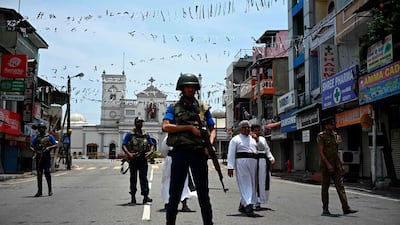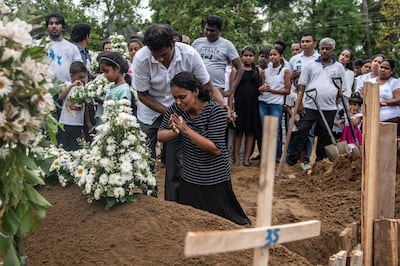Next month marks a decade since the end of the 27-year war in Sri Lanka, a conflict marked by mass atrocities and the deaths of tens of thousands of people in government-declared "no fire zones". Last weekend, on Easter Sunday, the country was plunged into crisis once again, with a series of horrific attacks on churches and hotels killing more than 350 people and injuring 500 more.
There are conflicting reports about who was responsible. ISIS has claimed it was behind the co-ordinated attacks, although it has provided no evidence. As more details emerge about the suicide bombers – of whom eight out of nine were Sri Lankan – the trail has led to what defence minister Ruwan Wijewardene described as a splinter group of the local Islamist outfit National Tawheed Jamaat (NTJ). Its previous record of desecrating Buddhist monuments, however, suggests if the group was behind the bombings, they "could not have been done just locally", according to prime minister Ranil Wickremesinghe. Much is yet to be uncovered about the network behind the killings. What is clear, however, is that international attention has been focused on the notion that the perpetrators were Muslim and the attacks were motivated by religious hatred.
For those who lived through the lengthy war, the sounds of helicopters circling overhead once again, a military-supervised curfew, the imposition of a state of emergency and the steady stream of reports that additional bombings might ensue are all too familiar and an unwelcome reminder of a very recent past. Since independence in 1948, Sri Lanka has been plagued by sporadic cycles of violence that, until now, have most often centred on some aspect of the Sinhala-Buddhist nationalist character of the country (the one notable exception was the government’s crushing of a Marxist student uprising in the 1970s and 1980s). The nearly three-decades-long war between the Sri Lankan government and the Liberation Tigers of Tamil Eelam (LTTE) followed decades of discriminatory government laws and policies against Tamils and other ethnic and religious minorities. Even Sri Lanka’s constitution entrenches a hierarchy of communities by explicitly giving Buddhism “the foremost place” on the island. This and other forms of structural discrimination is a result of the growth of Sinhala-Buddhist nationalism as an election strategy that continues to this day.
During the armed conflict, the Sri Lankan military positioned itself as the protector of that nationalism. The government often employed this rhetoric to rally support for the army, relying on majoritarian nationalism to overshadow numerous reports of mass atrocities occurring in the war zone. During the final months of the war, the Sri Lankan military massacred tens of thousands of Tamils in acts that are widely regarded as war crimes and crimes against humanity.
In the 10 years since May 2009, not a single military officer or government official has been held accountable for the heinous crimes that occurred during the war. Instead, even the current government elected in January 2015 on promises of “good governance and reconciliation”, led by president Maithripala Sirisena and Mr Wickremesinghe, quickly succumbed to pressure to “protect war heroes from foreign forces”. Indeed, after then UN human rights commissioner Zeid Raad Al Hussein in 2017 called for universal jurisdiction to be applied in the absence of any government action to bring offenders to account, Mr Sirisena said: “The government defends the security of all war heroes, from the army commander to the last soldier, and the government would not allow any foreign forces to lay hands on war heroes who laid down their lives to defend the country”. He has consistently refused to allow any international inquiry into allegations of war crimes by troops.
In fact, his government has promoted officers accused of committing human rights violations to senior domestic positions and diplomatic posts abroad. It has also vowed to protect the former defence secretary and preceding president, brothers Gotabhaya and Mahinda Rajapaksa, from international investigations and prosecutions.
The lack of accountability for violence has left an enduring legacy of human rights violations and a culture of impunity. Both characteristics have contributed to rifts between Tamils and the majority Sinhalese community. Tamils are increasingly frustrated by the government's lack of political will for accountability and the vast majority of the Sinhala community tend to regard a search for justice as an attack on their protectors and therefore, the nation.
Importantly, the absence of proper justice has also contributed to increasing the divide between Tamil and Muslim communities on the island. A failure to account for crimes committed by the LTTE and accusations that the Muslim community was instrumental in supporting Sri Lankan intelligence efforts have been detrimental to Tamil-Muslim relations. Islamophobia has also played a large role in shaping relations – or lack of them – between Sinhala and Muslim communities. Muslims are viewed as holding too much power, with numbers growing faster than other ethnic groups. Far-right Sinhala nationalist groups have portrayed the Muslim community as a threat to the Sinhala-Buddhist nation.
Instead of pursuing a meaningful path to reconciliation and accountability, the Sri Lankan government has allowed ethnic and religious tensions to fester, ensuring violence is easily kindled. Just last year, hate-filled, anti-Islamic social media posts by Buddhist hardliners sparked a week of riots in the town of Digana and led to three people being killed and dozens of mosques and homes being burned to the ground.
The Sri Lankan government’s post-war strategy has centred on heavily militarising Tamil areas and monitoring its inhabitants.This oppressive military control and surveillance of Tamils is what many experts reasonably fear will now be directed at Muslims in the country. Reports are already emerging from Batticaloa and Jaffna that security forces are stopping and checking people on the streets – a return to the era of military checkpoints, which were customary during the Rajapaksa and other wartime regimes.
On Wednesday, the government enacted emergency laws that are, by any account, draconian in nature and give the security forces far-reaching powers with very little oversight. In the north, the military has begun collecting names of Muslim families and is undoubtedly planning to do the same across the island. For Tamils and human rights defenders, who have been at the receiving end of these brutal policies in the past, this demonisation of the Muslim community is a worrying indicator of human rights violations to come.
In addition to a state crackdown on Muslims, there are real fears of community-level retribution and violence. In the few days since the bombings, there have already been a number of attacks on Muslim businesses and mosques across the island-state. On social media, calls to ban the niqab have begun circulating and many have started blaming the Muslim community for acts attributed to National Tawheed Jamaat. A fact that is often obscured is that the Muslim community in Kattankudy, Batticaloa district, where the NTJ was reportedly founded, protested against the group and even alerted the security forces to their presence years earlier. It is clear the greatest impact of the attacks will be felt where there are existing post-conflict faultlines in communities.
The Sri Lankan government's flawed leadership in the wake of these attacks, while concerning, is unsurprising. Leaked intelligence reports and statements from senior government officials confirm a "monumental lapse in intelligence gathering" as authorities received intelligence weeks before the attacks but failed to act on it. Mr Sirisena has promised an overhaul of security services and asked the defence minister and police chief to step down but for the families of the dead, that will be too little, too late. Some blame a dysfunctional government for the abysmal security lapse, with Mr Sirisena at loggerheads with the prime minister and even attempting – and failing – to replace him last year with Mr Rajapaksa. Others blame the security forces's disproportionate and discriminatory focus on the Tamil community, an enduring legacy of the conflict.
On Tuesday, in parliament's first sitting since the attacks, MPs resorted to petty squabbling instead of presenting a united and strong front to the country. The absence of leadership at all levels is alarming to communities left terrified by these attacks and, specifically, to those most vulnerable to reprisals. It is also particularly significant during an election year. A presidential victory is now all but guaranteed to Gotabhaya Rajapaksa, who oversaw the most brutal phase of the war as defence secretary. In the days since the attacks, he has already attempted to present himself as the "strong" figure who defeated the LTTE and whom the country needs once again. But a return to Rajapaksa rule is a return to authoritarianism, nepotism and corruption and will further entrench impunity for human rights abuses.
As we grapple with the devastation of Sunday’s violence and reflect on the war and its legacy, one thing is clear: Sri Lanka has been, and remains, far from achieving sustainable peace. Until the country deals with the root causes of the conflict, all communities will remain vulnerable to external and internal threats and tragically, never far from the brink of violence.
Dharsha Jegatheeswaran is a human rights lawyer and the research director for Adayaalam Centre for Policy Research in Sri Lanka



